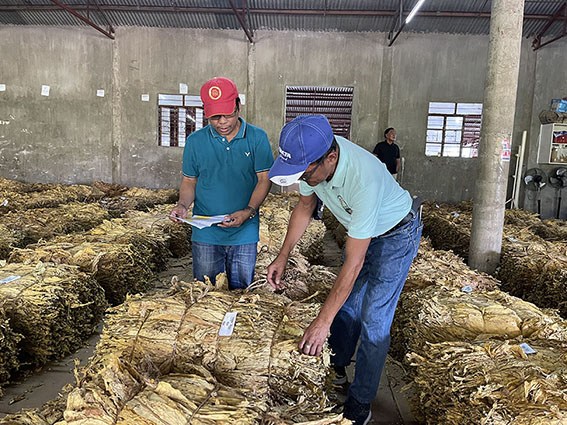
Tobacco farmers are selling at high prices in buying stations their produced flue-cured Virginia tobacco leaves, and the air-cured Burley and Native tobacco leaves this season.
Based on the latest NTA monitoring of tobacco trading operations, the buying price per kilogram of the prime class of tobacco or Class AA of the flue-cured Virginia tobacco has reached as high as P120.00, which is higher than the approved floor price of P97.00.
The buying price on the prime class of both air-cured Burley-type tobacco and Native–type tobacco is expected to reach up to P100.00 per kilogram, which is higher than the approved P81.00 floor price.
Considering the increasing trend in the actual buying price of tobacco, NTA Administrator Belinda S. Sanchez said the tobacco farmers will earn a lucrative income this season.
“The tobacco buying price increase reflects market demand and crop quality as well as the presence of good weather and the increase of floor prices,” said Administrator Sanchez.
The more income the farmers earn will boost their purchasing power to buy their foods and other basic needs in their household,” she added.
The trading for flue-cured Virginia tobacco started in February until June this year. Tobacco traders such as Universal Leaf Philippines, Inc (ULPI), Trans Manila Incorporated (TMI), and ConLeaf have opened buying stations in the provinces of Ilocos Norte, Ilocos Sur, La Union, and Abra. Aside from the tobacco traders, there are also NTA-accredited field canvassers, who are reaching out the farmers to buy their produced tobacco leaves.
For the air-cured Burley and Native tobacco leaves, its trading operations started on the last week of March until July in the provinces of Ilocos Norte, Ilocos Sur, La Union, Abra, Pangasinan, Isabela, and Cagayan.
The NTA is persistently committed to supervising and managing the implementation of farming technologies and capability enhancement of the farmers for the production of high-quality tobacco leaves.
Through NTA’s intervention coupled with the favorable climatic conditions, Administrator Sanchez expected that the volume of production of all types of tobacco this season will surpass the country’s 42 million kilograms of tobacco production in 2023.
Tobacco farming remains a steady source of income for thousands of Filipino families, providing livelihood opportunities and supporting rural economies. Currently, about 2.2 million Filipinos are financially dependent on tobacco including more than 430,000 farmers, farm workers, and their family members. The Philippine tobacco industry continues to dominate the agricultural, economic social, and political aspects of the country. Among the non-food crops in the agriculture sector, tobacco has been grown commercially, steadily contributing to the economy and the government’s efforts towards economic growth and recovery.

